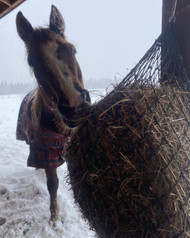Winter Horse Care Tips
Oct 16th 2023
As many around the country are heading in to the colder winter months.. here are a few winter reminders for your equine companions..
- Free choice hay is best. Our equine friends rely on forage to assist in keeping their body temperature up. Do you have “easy keepers” and fear free choice hay won’t be good for them, or your wallet? Hay Chix nets can be a great asset to your feeding regimen. It slows them down, reduces waste and keeps them busier longer. (On really cold days, a combo of netted and loose hay is ideal)
- Access to full, fresh, open water is very important. You can sprinkle some salt on their feed, have salt blocks available, and/or add electrolytes to their water if you suspect they aren’t drinking enough. Always be sure buckets and troughs are free of ice. Inadequate access to the above is one of the main causes of colic during the winter months.
- Adequate access to shelter. Three sided and facing away from the elements. Clean and nicely bedded is most ideal.
- To blanket or not to blanket? This can be controversial -
but there are many factors to consider when deciding if blanketing is best for
your horse or not - such as: Does my horse grow a decent winter coat? Do I plan
to work and/or ride my horse during winter? Will my horse be in the elements or
stabled during harsher weather? Is my horse growing older and needing extra
support? Is my horse’s body condition poor? Etc.
- Your horse’s natural coat is designed to help them survive their elements. Blanketing can/will actually harm this natural ability. If your horse is healthy, has a healthy, thick coat, you don’t plan to utilize them too much in the winter, and they are younger and able to regulate their body temperature okay - you may not need to blanket!
- If you start blanketing however, keep blanketing. Blankets hinder natural winter coat growth so if you stop blanketing they will most certainly be cold.
- Older horses have a more difficult time regulating their body temperature, so they may need the extra support of a blanket to help keep them warm.
- Ultimately, it’s up to you and your horse’s individual situations.
Best wishes this season!

